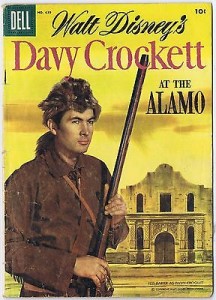It was in late fall, 1954 when the television show, DisneyLand, premiered a three part mini-series (maybe a TV first) on the life of frontiersman Davy Crockett, and the rest was television history.
The show took off like two riverboats in a race when Fess Parker became an overnight hero Disney style. Although there was an element of truth to the series, Davy Crockett, with the help of his sidekick George Russell, tamed the frontier, set Andrew Jackson’s Congress straight and was the last man standing at the Alamo. Impressive for someone we kids had not heard of before Disney.
Disney styled his programs to appeal to children and Davy Crockett was no exception. Davy could grin down a bear with his charming toothy smile. His sidekick Russell, played by Buddy Ebsen (later of Beverly Hillbillies fame), followed Davy everywhere plunking on his guitar and singing verses of what would become a number one hit record, “The Ballad of Davy Crockett.”
Although politically incorrect and offensive in parts by today’s standards and enlightenment (such as references to Native Americans, British, Mexicans and perhaps Congress), given the context of the time it was presented, the program introduced young people to several chapters of American History (as embellished by Disney) and began a mania of Davy Crockett emulation and hero worship.
As the Christmas season approached, stores and catalogs were filled with coonskin hats, miniature Alamos with plastic and rubber fighters, buckskin jackets, toy rifles, rubber Bowie knives and a host of other paraphernalia. Even prior to the holidays, kids were flocking to the stores to buy comic books, trading cards and records while they eagerly anticipated the next “official” Davy Crockett something (which, shortly, would be Davy Crockett and the Riverboat Pirates).
Even other shows mentioned Crockett. Jackie Gleason, who portrayed Ralph Kramden on the Honeymooners, belonged to a fraternal group called the Raccoons whose members wore a coonskin cap like Davy. This was before the series but now had gained popularity because of it. On one program, Gleason enters the room dressed in his lodge uniform with cap and the little boy Ralph’s wife Alice was babysitting, rubs his eyes and states: “I never knew Davy Crockett was so fat!”
The series ran one night a week for three weeks and by then kids were discussing and playing Davy Crockett Indian Fighter, Davy Crockett Goes to Congress or Davy Crockett at the Alamo. Disney announced a movie would be released with all three episodes combined into a full length movie. This was great because now we could go to the show and see Davy in color on the big screen.
My gang pretended that Jose’s front porch was the Alamo, and Rich and I defended it while Freddie and Jose (you guessed it, Jose was Santa Anna) attacked it and we wound up breaking a few pickets along the railing as the attackers scaled the fort.
Aside: I remember that Jose’s mom always wanted him to be the “good” guy when we played war but it was interesting that his role was Santa Anna when we played Alamo. As I reflect back with the wisdom of an old man, perhaps Jose was the good guy at the Alamo, considering Texas did belong to Mexico at the time.
For over a year after the series premiered, there was not a kid in the neighborhood who didn’t have a coonskin cap. The fervor of response to Davy Crockett may have been due to the times. It was 1955 and communism and nuclear war were the threats of the day. Crockett instilled a sense of patriotism in kids and a sense of pride in our country and its defense.
When our local theater, the Will Rogers, displayed a sign that Davy Crockett was playing that Saturday only, kids lined up down the street to see the movie thinking it was the much anticipated Disney version. In a rare gesture, my father took me to the show. As the lights dimmed, my excitement could not be contained. It was then I learned about bait-and-switch, and misleading advertising.
The theater manager had gotten hold of a cheap print of some old black and white movie where Davy Crockett was only mentioned in passing. My father was pissed and stated that he had seen this movie on television recently. Kids were beyond disappointed and parents who had taken their kids began to gather outside the manager’s office door (he locked himself inside) to demand a refund.
“Read the marquee,” the manager yelled out from behind the locked door. Above the big bold red letters stating “Davy Crockett,” just above, in small black letters, “Son of.” And that is what I heard a lot of fathers mumbling as they left the theater, “Son of…”
